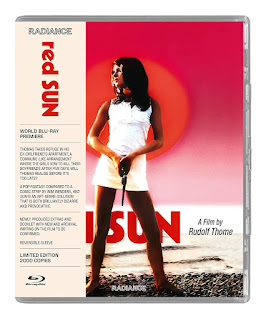Red Sun
Who, what, where, when and why provide the structural foundation for most professional writing…even screenplays. Pull any script off a shelf and you’ll get a formatted breakdown of characters and settings laid out in rather rigid fashion. But it’s that lingering why that separates a by-the-numbers story from a compelling one. In fact, those films that choose not to answer can leave the biggest impression. Like Ruldolf Thome’s Red Sun (1970), a film that addresses the shockwaves of the social and sexual revolution but refuses to supply easy answers.
Thomas, an unapologetic layabout and habitual moocher, talks his way into the apartment of an old girlfriend, Peggy, who shares the space with three other women. Sharing expenses and revolutionary ideologies, the quartet live by a strict set of rules: any man they date must die within five days. Thomas, loathe to give up a good domestic situation, takes this shocking news in stride, refusing to believe that Peggy would actually make him suffer the same fate. But internal feuding threatens to destroy the bonds of sisterhood…and redefine the cost of true romance.
Simultaneously commenting on extreme feminism, domestic terrorism and failed counter-culture idealism, Red Sun bites off more than most filmmakers would take on at any point in their career. But, being only his second film, director Ruldolf Thome approaches the material fearlessly and with a great deal of satirical absurdity. There’s a strong Godardian influence at work here, playing with genre conventions almost as an exercise in style rather than a realistic take on the issues (which many angered many critics at the time of release but has aged very well). Thome risks the audience writing off his film as a “think piece,” but manages to hang just enough fashionable narrative on its shoulders to get by.
It's one hell of a concept. And Red Sun’s female assassins are a fascinating bunch. As Peggy, Uschi Obarmaier (a model linked with the Stones and Hendrix) radiates an aura of stoned sexuality and cold-blooded determination. Thome never gives his heroines a reason for their anti-men crusade; it simply evolves from nature like Hitchcock’s The Birds. And in doing so, prompts the audience to come up with their own explanation. It’s a brilliant decision…and a brilliant piece of filmmaking.
Making it’s Blu-ray world premiere from Radiance Films, the limited-edition comes with a 52-page booklet, select scene commentary and a pair of visual essays covering the cultural impact of the film and the development of New German Cinema.




Comments
Post a Comment